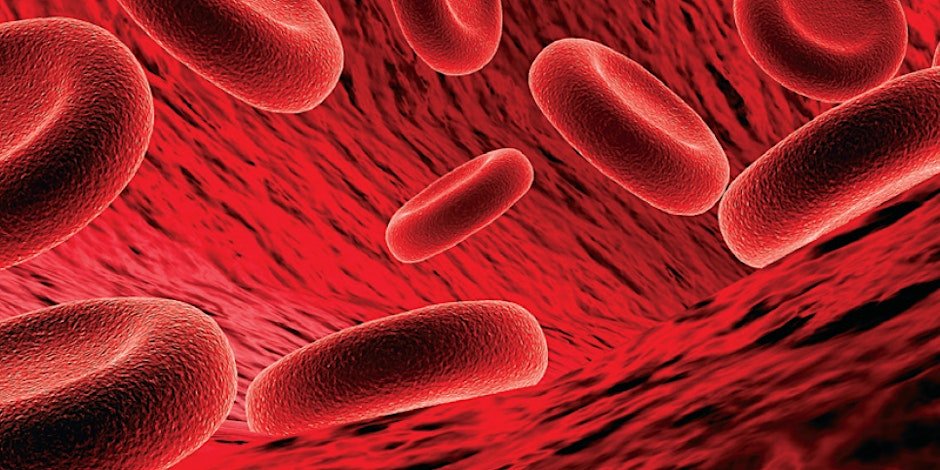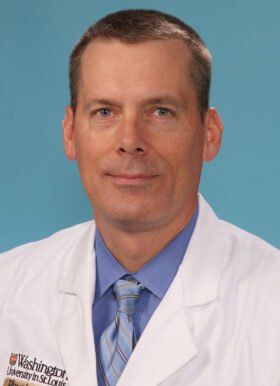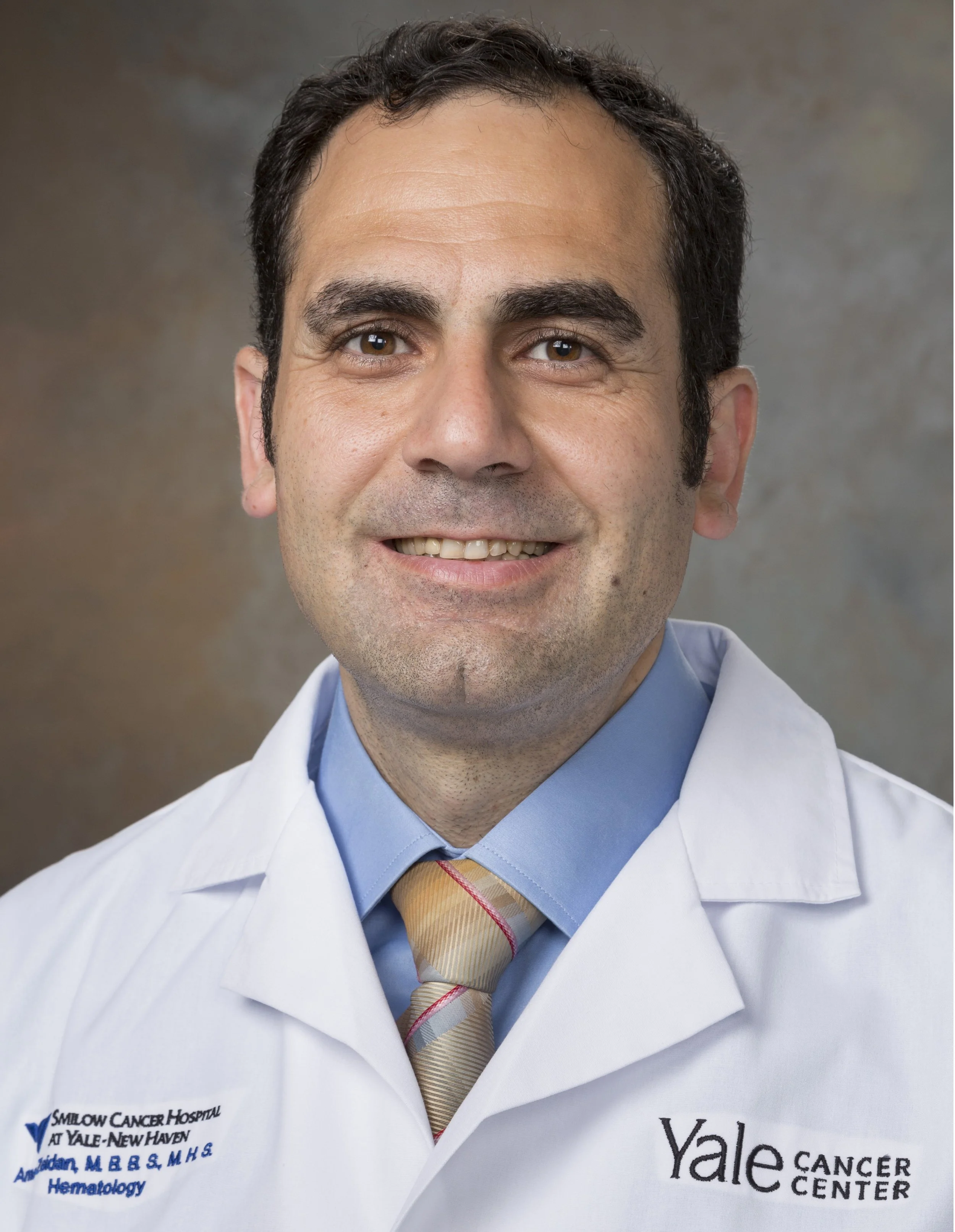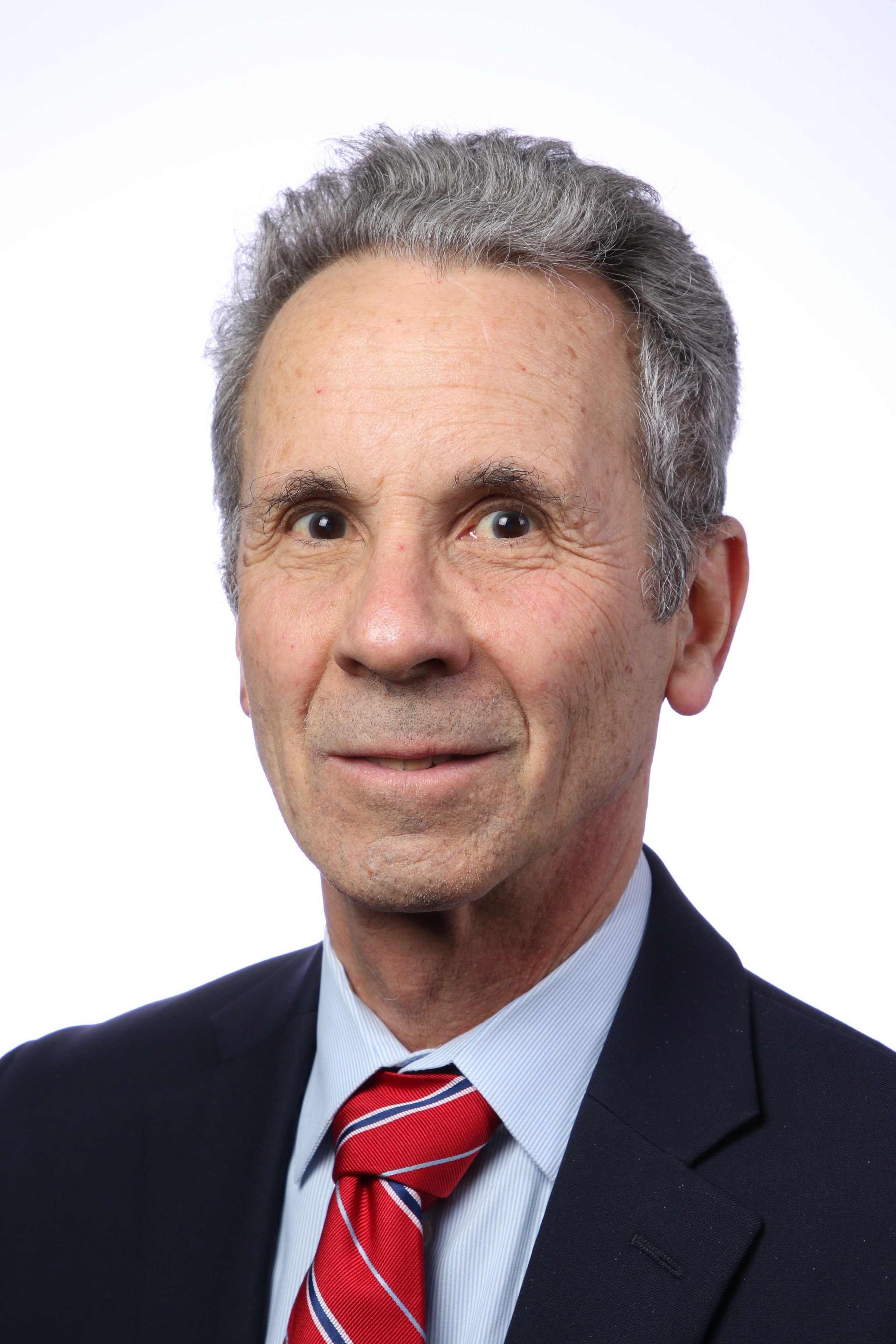
Speakers
-

Dr. Jeremy Abramson
Dr. Abramson is Director of the Lymphoma Program and the Jon and Jo Ann Hagler Chair in Lymphoma at the Massachusetts General Hospital Cancer Center, and Associate Professor of Medicine at Harvard Medical School. Dr. Abramson earned his medical degree from the Mount Sinai School of Medicine in New York City and a Masters Degree in Medical Sciences in Clinical Investigation from Harvard Medical School. He completed a residency in Internal Medicine at the Massachusetts General Hospital in Boston, followed by a fellowship in Hematology and Oncology at the Dana-Farber Cancer Institute. Dr. Abramson's clinical and research interests are in non-Hodgkin lymphomas, Hodgkin lymphoma, and CLL. His research involves the design and conduct of clinical trials of targeted therapies and immunotherapies in these diseases.
-

Dr. Hanny Al-Samkari
Dr. Hanny Al-Samkari is the Peggy S. Blitz Endowed Chair in Hematology/Oncology at the Massachusetts General Hospital and an Associate Professor of Medicine at Harvard Medical School. He is a classical hematologist and NIH-funded clinical investigator and clinical trialist. He also serves as Co-Director the MGH Hereditary Hemorrhagic Telangiectasia (HHT) Center of Excellence. His clinical and research interests are in hemostasis, thrombosis and hemolysis, with focuses in HHT, immune thrombocytopenia, and hemolytic anemias. As a clinical investigator, Dr. Al-Samkari is an internationally recognized expert in the clinical development of novel therapeutics for these disorders and serves as the lead principal investigator for multiple ongoing clinical trials. He is the current Executive Editor of Hematology: The ASH Education Program, an American Society of Hematology peer-reviewed publication, and has published over 150 peer-reviewed manuscripts. His original research has been featured in The New England Journal of Medicine, The Lancet, Annals of Internal Medicine and Blood, among other top peer-reviewed journals in hematology and medicine.
-
Dr. Kenneth Bauer
Kenneth A. Bauer, MD is a hematologist at Beth Israel Deaconess Medical Center and a Professor of Medicine at Harvard Medical School. He received his medical degree from Stanford and completed his residency at the University of Chicago. He was a fellow in medical oncology at Dana Farber and hematology at Beth Israel. Dr Bauer’s research interests include elucidation of the mechanisms leading to the development of a prethrombotic state and clinical evaluation of new antithrombotic drugs. He has published over 300 original reports, reviews, and chapters. Dr Bauer received an Esteemed Career Award from the International Society on Thrombosis and Haemostasis (ISTH) in 2022.
-
Dr. Matthew Davids
Dr. Davids is an Associate Professor of Medicine at Harvard Medical School and Clinical Research Director in the Division of Lymphoma at Dana-Farber Cancer Institute, in Boston, Massachusetts. He also serves as the Leader of the Lymphoma Program for the Dana-Farber/Harvard Cancer Center. In addition to maintaining a busy clinical practice focused mainly on CLL, Dr. Davids leads numerous clinical trials of novel combination regimens for patients with CLL and lymphoma. He also runs an independent laboratory that utilizes functional precision medicine techniques to study patient samples, with a goal of predicting response to therapy and understanding resistance mechanisms to targeted therapies.
-

Dr. Matteo Della Porta
Matteo Giovanni Della Porta is head of the Leukemia Unit at Humanitas Cancer Center in Milan, where he is also the head of the Genomic of Hematologic Neoplasms Lab. He is a full professor of Hematology at Humanitas University and director of the Center for Accelerating Leukemia/Lymphoma Research, a joint effort from Humanitas University, Humanitas Research Hospital, Humanitas AI Center, and the Politecnico di Milano. He obtained his Medical Degree with honors at the University of Pavia Medical School, Italy in 1999. From 2000 to 2003 he completed his training in Hematology at the Department of Hematology, University of Ferrara Medical School, Italy, and obtained his Residency Degree with honors. From 2004 to 2006 he was awarded a postdoctoral fellowship at the Department of Hematology, University of Pavia Medical School, Italy. In 2008, he became an associate professor of clinical oncology at the University of Pavia Medical School, Italy. In 2016, he moved to Humanitas University, where he is now a full professor of Hematology and head of the Leukemia Unit at Humanitas Cancer Center. Current research interests mainly concern myeloid malignancies (myelodysplastic syndromes, acute myeloid leukemias, and myeloproliferative neoplasms): Genomics of myeloid neoplasms; Diagnosis and prognostication; Personalized medicine; Artificial Intelligence in hematology; Decision Support Systems. As of January 2023, he authored more than 170 peer-reviewed papers with an h-index, according to Scopus, of 57. Della Porta’s research has been funded, among others, by the European Union, the Italian Association for Cancer Research (Fondazione AIRC), the Italian Ministry of Health, the Italian Ministry of University and Research (MIUR), and the Beat Leukemia Foundation.
-

Dr. Doruk Erkan
Dr. Doruk Erkan is a Physician-Scientist at the Barbara Volcker Center for Women and Rheumatic Diseases, Attending Rheumatologist and Clinical Researcher at Hospital for Special Surgery, and Professor of Medicine at Weill Cornell Medical College.
In addition to his rheumatology practice, Dr. Erkan has a long-standing research interest in Antiphospholipid Syndrome (an autoimmune clotting disorder) and Systemic Lupus Erythematosus (SLE or “lupus”). After his Internal Medicine residency at Beth Israel Medical Center in New York, he completed his Rheumatology fellowship at Hospital for Special Surgery in New York. Dr. Erkan has a medical doctor (MD) degree from Hacettepe University School of Medicine in Ankara, Turkey and a master of public health (MPH) degree from Johns Hopkins University School of Public Health in Baltimore, Maryland.
Dr. Erkan has received several honors and awards from the American College of Rheumatology and the Arthritis Foundation for his research. He has published over 200 articles including research papers and invited editorials, as well as over 35 book chapters, and he has given over 170 research presentations and 200 invited lectures.
-

Dr. Brad Kahl
Brad Kahl, MD, is a professor of medicine and director of the lymphoma program at Washington University School of Medicine, St. Louis. His clinical practice focuses on patient with lymphoma and CLL. He is a member of NCCN CLL guidelines panel. Dr. Kahl’s research focuses on improving outcomes for patients with lymphoma through testing novel agents in well-designed clinical trials. He is Chair of the ECOG-ACRIN lymphoma committee and serves on the NCI Lymphoma Steering Committee. He is also a member of the Lymphoma Research Foundation Scientific Advisory Board and previously served as Chair of the LRF Mantle Cell Lymphoma Consortium.
-

Dr. Gareth Morgan
Dr. Gareth Morgan is a Professor of Medicine at NYU’s Grossman School of Medicine whose research focuses on characterizing the myeloma genome to identify disease drivers and predisposition loci. Following initial work focused on developing the polymerase chain reaction for clinical application in chronic myeloid leukemia and lymphoproliferative diseases pioneering the fields of clonality testing and minimal residual disease monitoring he shifted his attention to studying the genome of multiple myeloma. He was the first to describe the presence of intra-clonal heterogeneity in myeloma providing evidence for a Darwinian-based model of disease progression and for the generation of refractory disease based on branching evolutionary patterns. He developed this model further, successfully describing the molecular lesions and mutational signatures underlying the transition from benign monoclonal gammopathy of undetermined significance through smoldering myeloma and newly diagnosed myeloma to plasma cell leukemia. This work has fundamentally changed our understanding and classification of myeloma and its precursor conditions, as well as the approach to treatment, bringing the field to a more personalized approach. He has carried out a number of llarge GWAS analyses together with international collaborators including British, German and Swedish groups to define the genetic loci and signatures associated with the risk of developing myeloma and their relevance to the excess risk seen in African Americans. He has developed and been PI on a number of large Phase III studies in that have set the current standard of care for myeloma treatment in both younger and older patients. He has mentored 35 investigators in the past 15 years, of whom 14 have gone on to careers as clinical investigators.
-

Dr. Alison Moskowitz
Dr. Alison Moskowitz is an Associate Attending within the Lymphoma service at Memorial Sloan Kettering Cancer Center. She earned her medical degree at Albert Einstein College of Medicine, completed an internship and residency in internal medicine at Columbia University Medical Center, and completed fellowship in medical oncology at Memorial Sloan Kettering Cancer Center.
Dr. Moskowitz’s research is dedicated to developing new treatment strategies for T‐cell lymphoma and relapsed/refractory Hodgkin lymphoma. Her research program in Hodgkin lymphoma focuses on developing novel treatment approaches for patients with relapsed or refractory disease and identifying factors predictive of response to therapy and overall outcomes. The aim of this work is to ultimately develop individualized therapy for patients with Hodgkin lymphoma that optimizes cure and limits long‐term toxicity.
For T‐cell lymphoma, she aims to develop new agents through clinical trials that incorporate strong correlative studies aimed at identifying markers of sensitivity and resistance. These studies will allow us to design personalized treatment approaches, predict optimal combination strategies, and ultimately improve prognosis by rationally designing regimens that target the diverse T‐cell lymphoma entities.
-

Dr. Noopur S. Raje
Noopur S. Raje, MD, is Professor of Medicine at Harvard Medical School, the director of the Center for Multiple Myeloma, and the Rita Kelley Chair in Oncology at Massachusetts General Hospital Cancer Center in Boston, MA, USA. She studied medicine at B.J. Medical College, Pune University, India, and trained in internal medicine at Massachusetts General Hospital. This was followed by a fellowship in hematology/oncology at the Dana-Farber Cancer Institute, Boston.
Dr. Raje’s research focuses primarily on developing novel therapeutic strategies for the treatment of multiple myeloma and related plasma cell disorders. Her laboratory efforts are aimed at identifying cellular signaling pathways that contribute to the survival and proliferation of myeloma cells in the bone environment. Stemming from these studies, she has developed and led clinical trials to specifically harness these pathways. Her expertise in cellular therapies has led to FDA approval of the first in class CAR T cell product, Ide-cel in myeloma. Her work related to myeloma bone disease has resulted in FDA approval of the first in class RANK ligand antibody, denosumab.
Professor Raje is co-chair of the National Cancer Institute Myeloma Steering Committee, co-chair of the Educationa Committee of the International Myeloma Society, a member of the International Myeloma Working Group, and serves on educational committees for ASCO and ASH. She has received several awards and has published widely on multiple myeloma.
-

Dr. Rajjit Rampai
Dr. Rampal is an Associate Member at Memorial Sloan-Kettering Cancer. He is Director of the MPN and Rare Hematologic Malignancies Program at MSK and also Director of the Center for Hematologic Malignancies at MSK. The focus of his laboratory and clinical research has been elucidate mechanism of pathogenesis of the Philadelphia-chromosome negative Myeloproliferative Neoplasms (MPN) and to develop novel mechanism-based therapeutic approaches for MPNs.
-

Dr. A. Koneti Rao
A. Koneti Rao, M.B.B.S. is Sol Sherry Professor of Medicine, Professor of Cardiovascular Sciences, Co-Director of the Sol Sherry Thrombosis Research Center (SSTRC), and Director of Benign Hematology, Hemostasis and Thrombosis, at the Lewis Katz School of Medicine (LKSOM) at Temple University, Philadelphia. Dr. Rao has served in leadership positions at LKSOM – as the Associate Dean for the MD-PhD program, Director of SSTRC, and the Chief of the Hematology Section. He has over 250 original publications, editorials, and reviews. Dr. Rao’s major research interest has been in the area of platelets, on the molecular mechanisms of inherited platelet disorders, with a focus on RUNX1-related platelet abnormalities. His other research interests are in diabetes mellitus and antithrombotic therapy.
Dr. Rao is one of the founding Principal Editors of the journal PLATELETS (Publisher: Carfax Publishing). He has served a member of the editorial boards of Blood and Platelets, and as Associate Editor (Hemostasis and Thrombosis) of Henry’s Clinical Management by Laboratory, McPherson and Pinkus (Editors), 23rd and 24th Editions.
He is the recipient of the ISTH Investigator Recognition Award for Contribution to Hemostasis (1997); Temple University Faculty Research Award (2001); F1000 Prime - Faculty Member of the Year 2013 Award; Distinguished Career Award, South Asian Society for Atherosclerosis and Thrombosis (2006); Distinguished Scientist Award, Department of Medicine, LKSOM (2014); Charles Koller Memorial Lectureship, M.D Anderson Cancer Center (2017); Senior Research Excellence Award, LKSOM (2018). Dr. Rao is a member of the American Society for Clinical Investigation, the Inter-Urban Clinical Club founded by Sir William Osler in 1905 (served President 2004-05), the AOA Honor Society, and a Fellow of the AHA and the ACP. He has served on NIH study sections and has been funded by NIH grants since the 1980s.
-

Dr. S. Vincent Rajkumar
Dr. S. Vincent Rajkumar is Edward W. and Betty Knight Scripps Professor of Medicine at Mayo Clinic, Rochester, Minnesota. He is the Editor-in-Chief of Blood Cancer Journal, and also serves as the Associate Editor for Mayo Clinic Proceedings, Leukemia, and European Journal of Hematology. He is co-chair of the International Myeloma Working Group (IMWG), and Chair of the Eastern Cooperative Oncology Group (ECOG) myeloma committee. Dr. Rajkumar is the Chair of the Board of directors of the International Myeloma Foundation and a member of the National Institutes of Health’s Multiple Myeloma Steering Committee. He is the recipient of multiple awards for his contributions to myeloma research including the Jan Waldenstrom Lifetime Achievement Award, the Robert A. Kyle Lifetime Achievement Award, and the Giants of Cancer Care Award. He was named Mayo Clinic Distinguished Investigator in 2018. His scientific contributions include clinical trials, epidemiological studies, and laboratory research focused on myeloma and related disorders. He has led several large studies on the prevalence and progression of monoclonal gammopathies, racial disparities in the incidence of myeloma, and familial predisposition. Dr. Rajkumar has over 800 publications, including over 500 peer-reviewed original research papers and 250 reviews and book chapters.
-

Dr. Amer Zeidan
Amer Zeidan, MBBS, MHS is a Professor of Medicine at Yale School of Medicine. He serves as the Chief of the Division of Hematologic Malignancies, Director of Hematology Early Therapeutics Research, and Assistant Director of the Clinical Trial Office for Hematology at Yale Comprehensive Cancer Center (YCC). He is also the leader of Leukemia and Myeloid malignancies Clinical Research Team. Dr. Zeidan obtained his medical degree with honors from University of Jordan, followed by residency in Rochester General hospital, Rochester, NY. He then completed a Hematology/Oncology fellowship and a clinical research fellowship in myelodysplastic syndromes (MDS) at Johns Hopkins University where he also earned a Master of Health Science (MHS) degree in Clinical Investigation. He joined Yale Faculty in 2014 where he has become an internationally recognized expert in myeloid malignancies. Dr Zeidan has been conducting research on the development of novel therapies for myelodysplastic syndromes and acute myeloid leukemia (AML) with a special focus on targeted and immunotherapy-based approaches.
Dr. Zeidan has and continues to serve as study chair and principal investigator of multiple investigator-initiated, cooperative group and industry sponsored clinical trials for myeloid malignancies. He previously served as the vice chair of the YCC Data and Safety Monitoring Committee (DSMC) and as chair of Protocol Review Committee (PRC). He has served on multiple steering committees and independent data and safety monitoring committees for randomized and registrational clinical trials. Dr. Zeidan is also a member of the MyeloMATCH Precision medicine initiative of the National Cancer Institute (NCI) for MDS and AML and is very active within the Cancer Therapy Evaluation Program (CTEP) and Early Therapy Clinical Trial Network (ETCTN) focusing on early phase clinical trials of novel therapies for myeloid malignancies.
Dr Zeidan has contributed to the approval of multiple drugs for myeloid malignancies including oral decitabine/cedazuridine (Lancet Haematology), luspatercept (NEJM and Lancet), and imetelstat (Lancet). Dr Zeidan has been active in organizing the scientific community on important initiatives including publishing a guidance on management of MDS/AML during the corona pandemic (Lancet Haematology) and revising the International Working Group response criteria for higher risk MDS (Blood Journal). He is also founder and chair of the International Consortium for MDS (icMDS) which has championed important initiatives such as harmonizing the WHO and ICC classification systems (Lancet Haematology) and standardizing eligibility for MDS clinical trials (Blood Journal). Dr Zeidan also delivered many invited talks at National and International meetings including grand rounds in several prestigious institutions.
Dr. Zeidan’s work has been recognized by several prestigious awards including the Leukemia and Lymphoma Society Scholar in Clinical Research award, the National Cancer Institute Cancer Clinical Investigator Team Leadership award, the AAMDSIF/Evan’s Foundation-MDS Clinical Research Consortium Fellowship award, the Tito Bastianello Young Investigator Award, the ASCO Young Investigator Award, and multiple other achievement awards. Dr. Zeidan also serves on the editorial board and is a reviewer of several important hematology and oncology journals. He is an author on more than 360 peer-reviewed publications and book chapters and more than 250 scientific abstracts.
-

Dr. David Porter
Dr. Porter is the Jodi Fisher-Horowitz Professor of Leukemia Care Excellence at the Perelman School of Medicine and Abramson Cancer Center, and the Director of the Center for Cell Therapy and Transplant at the University of Pennsylvania. He is also the co-director of Penn’s Colton Center of Excellence in Cell Therapy for Autoimmune Disease. Dr Porter chairs or serves on numerous local, national and international committees focused on hematologic malignancies, stem cell transplantation and cell therapy. He is a past Chair and emeritus member of the Board of Directors of the National Marrow Donor Program and currently serves as President of the American Society for Transplantation and Cellular Therapy. He is the Deputy Editor of Transplantation and Cellular Therapy and is an Associate Editor for the American Journal of Hematology. Dr. Porter is an accomplished clinical investigator with an extensive publication record and has been the primary or co-author of over 250 research and review articles. Among other research highlights, he participated in the early development of reduced intensity allogeneic SCT, novel studies to limit GVHD, and along with colleagues at the University of Pennsylvania has pioneered the successful development of CAR T cells for cancer.
-

Dr. Gilles Salles
Gilles Salles, MD, PhD, is the Chief of the Lymphoma Service and holds the Steven Greenberg Chair at Memorial Sloan Kettering Cancer Center in New York since 2020. He is also a Professor of Medicine at Weill Cornell Medical College. Previously, he was a Professor of Hematology and Medicine at the University of Lyon and led the Department of Hematology at the Centre Hospitalier Lyon-Sud in France. Professor Salles earned his PhD in differentiation, genetics, and immunology, along with his medical degree, from Université Claude Bernard Lyon-1. He completed additional training in oncology and worked as a researcher at the Dana-Farber Cancer Institute at Harvard Medical School in Boston, Massachusetts, USA. Throughout his career, Professor Salles has demonstrated a strong interest in the clinical and biological study of lymphoma. His main focus has been on identifying and validating prognostic factors and designing clinical trials for B-cell lymphomas. He has been involved in researching and developing new therapeutic agents, including several targeted therapies, novel monoclonal antibodies, cellular therapies, and other immunotherapies in the field. He led large international studies evaluating treatment options for patients with follicular and diffuse large B-cell lymphoma. Previously, Professor Salles chaired the Lymphoma Study Association, a European cooperative group. He has served as an Associate Editor for the journal Haematologica since 2021. Professor Salles has authored over 500 publications, including articles in international peer-reviewed journals such as The New England Journal of Medicine, The Lancet, Cancer Discovery, Blood, Journal of Clinical Oncology, Lancet Oncology, and Haematologica.

